
PHP origin and historical development
PHP (Hypertext Preprocessor) is a server-side scripting language, originally developed by Dennis Richez (Rasmus Lerdorf) in 1994 Created in year. The origins of PHP can be traced back to Rasmus Lerdorf developing a simple tool called "Personal Home Page Tools" to record his personal online resume and monitor website traffic. By 1995, Rasmus Lerdorf released the first version of PHP and renamed it "PHP/FI" (Personal Home Page/Forms Interpreter).
With the rapid development of the Internet, PHP has gradually become a popular server-side scripting language and is widely used in the field of Web development. PHP's grammatical style draws on C language, Java and Perl, and is easy to learn and use, allowing many developers to quickly get started and perform web programming.
During the historical development of PHP, it has experienced multiple versions of updates and improvements. In 1997, PHP 2.0 was released, introducing the concepts of classes and function libraries, making the code easier to organize and maintain. The subsequent PHP 3.0 version added functions such as support for MySQL database, further improving the practicality of PHP in web development. PHP version 4.0 was released in 2000, adding support for object-oriented programming, allowing developers to better encapsulate and reuse code. The PHP 5.0 version released in 2004 introduced many new features, such as exception handling, object-oriented improvements, and SQLite support, which further enhanced the functionality and performance of PHP.
Now, PHP has developed to version 7.x, continuously optimizing its performance and functions, and improving code execution efficiency and security. Below we will show some basic syntax and features of PHP through specific code examples:
<?php echo "Hello World!"; ?>
<?php
$myVariable = "Hello PHP!";
$myNumber = 10;
$myArray = array("apple", "banana", "cherry");
?><?php
$number = 5;
if ($number > 0) {
echo "Positive number";
} elseif ($number < 0) {
echo "Negative number";
} else {
echo "Zero";
}
?><?php
for ($i = 0; $i < 5; $i++) {
echo "The number is: " . $i . "<br>";
}
?>Through the above code example, we can see To PHP's concise and powerful syntax features, as well as its flexible application in Web development. As Internet technology develops, PHP still maintains its important position and becomes one of the preferred languages for the development of many websites and applications. We look forward to PHP continuing to innovate in future development to provide developers with more convenience and efficiency.
The above is the detailed content of PHP origin and historical development. For more information, please follow other related articles on the PHP Chinese website!